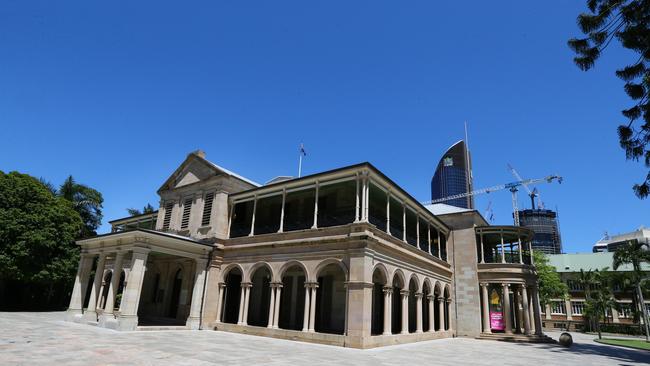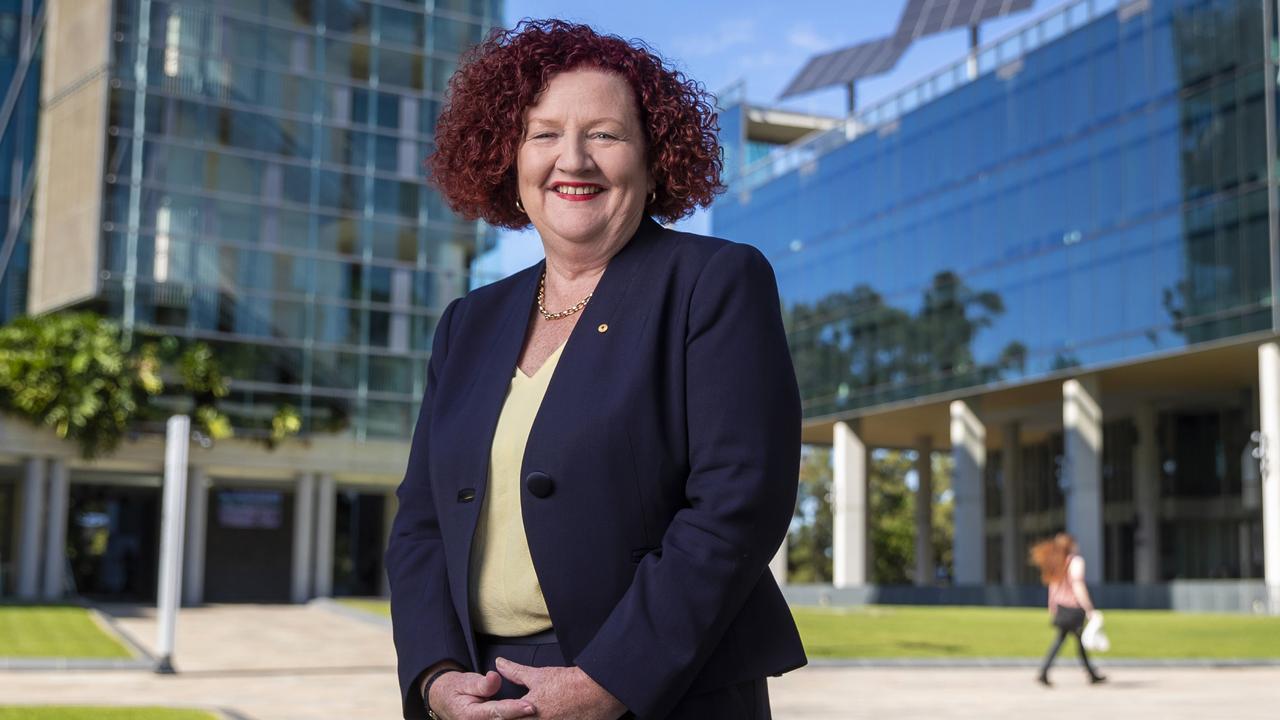Queensland university O-Week horror stories laid bare
University O-Week has been labelled a “red-zone” for its high risk of sexual assaults and harassment, with cruel hazing rituals commonplace for students living on campus.
Tertiary
Don't miss out on the headlines from Tertiary. Followed categories will be added to My News.
University O-Week has been labelled a “red-zone” for its high risk of sexual assaults and harassment, with cruel hazing rituals and bullying commonplace for students living on campus.
Queensland is the worst state in the country for sex assaults on campus, according to student support advocates, who are calling for far more protection for students.
A number of students have detailed their traumatic experiences during O-Week, which kicks off February 12, with one describing it as “the worst week of her life”.
The students, who all asked to remain anonymous to protect their identity and for safety, shared horrible experiences while studying at leading universities including UQ and QUT.
Kriya* still has fear of repercussions from the university but revealed they had to wait a semester to see a female counsellor and was forced to retell their assault story to every lecturer and tutor to get academic support.

Another female student, Sally*, said she and other students were shouted at to go to their rooms where they found the cupboards filled with goon boxes and forced to binge drink until they were sick while living at St John’s College at UQ.
“We were told to go get changed into something we could vomit on,” she said.
End Rape on Campus (EROC) director Sharna Bremner said women, trans and international students living in residential colleges on campus were the most at risk of assaults, particularly during O-Week.
“We don’t need a calendar to know when its O-Week because we see a surge in cases come through afterwards,” she said.
Ms Bremner said it was “embarrassing” universities were doing “less than the bare minimum to prevent sexual assault”.
“Queensland is a state we hear about more than others and also disproportionately given the number of students in the state compared to others,” Ms Bremner said.
She students needed to be educated on how to report sexual violence in universities.

“Some people don’t even know what to do and where to go,” she said.
One student, who asked to remain anonymous, recounted having to wait a semester to see a female counsellor and was forced to retell their assault story to every lecturer and tutor to get academic support
Ryan*, 19, from Emmanuel College said some “freshers” or first year students in O-Week were given humiliating nicknames like “balloony” referring to a girl’s breasts.
“There would also be events organised which involved the younger girls drinking heavily around older guys.”
“In one scenario, I was locked in a room with two other freshers and two older students. They performed an act of hazing by slapping all of us repeatedly, while the other student ‘chopped’ our rooms by throwing our beds around,” he said.
Sally* said she was told to change into clothes they could vomit on and she and others were bullied into binge drinking, while other students had food thrown at them.
“My parents said if I’m ever in an abusive relationship, at least I’ll be okay because I dealt with about 300 of them,” she said.
“There were things called ‘lock ins’ where the second and third years of our block which was about 20 people, would separate the boys and girls and binge drink in the bathrooms with all the showers running so it would be hot and there would be a certain number of goon boxes that had to finished,’” she said.
University of Queensland Union Student Rights Vice President Jordy Duffey said sexual violence was an ongoing issue on campus.
“We come here to study, we come here to learn, and the university can fail to recognise there’s systemic barriers where students don’t feel comfortable to report,” they said.
Mx Duffey said campus should be a safe space for students to access their education.

“A student’s safety and wellbeing should be the priority for any university,” Mx Duffey said.
An Emmanuel College Spokesperson said the safety of all residents at Emmanuel College is of the utmost importance to and something taken incredibly seriously.
“We are unable to discuss specific incidents for confidentiality reasons and to protect the privacy of the young people who may be involved.
A St Johns College Spokesperson said St John’s College has an unwavering focus on student safety, respect, and inclusive diversity.
STUDENT STORIES IN THEIR OWN WORDS
* Names have been changed to protect students’ identity.
RYAN*, 19, EMMANUEL COLLEGE UQ
“I just didn’t want to leave my room”
“Students were given “fresher names” usually to do with embarrassing past events that they were told during prep week from their friends. These names would also include sexual references like “balloony” referring to a girls breasts as balloons and “gong” referring to another girls face as looking like a gong. They have challenges called “convener challenges” in which people had to complete a challenge to avoid being put as a toilet or kitchen convener. These people would essentially clean up any mess anyone made in those areas. This included sculling a full goon bag as quickly as possible (the loser would become the kitchen convener) and other alcoholic challenges. There would also be events organised which involved the younger girls drinking heavily around older guys. In one scenario I was locked in a room with two other freshers and two older students. They performed an act of hazing by slapping all of us repeatedly, while the other student ‘chopped’ our rooms by throwing our beds around, throwing our desks up and removing items of clothing from wardrobes. Constant bullying would occur without any intervention. If brought to the front office, nothing would be done about it despite a report to talk to some of the students. I was diagnosed with severe depression and anxiety by the end of the year. I just didn’t want to leave my room.”
KRIYA*, SOUTH EAST QUEENSLAND, SHE/THEY
“It took me a whole semester to get an appointment with a female counsellor”
“The uni didn’t implement academic adjustments even if I made an informal complaint. There was no co-ordination between different units so I had to share my experience every time I reached out for support and I was re-traumatised as a result. Some academic staff have no idea what they have to do when a student says they have experienced sexual violence. As a result I lost many opportunities and couldn’t reach my fullest potential in my academic studies. There is no legal support within the university on sexual violence. I was not even aware of where to go when this happened to me. I didn’t even know I could go to police. There was no one place I could go to in uni to obtain all the information and help me connect with other service providers. So I had to talk to different service providers at different times when they are available which further traumatised me. There were no female counsellor to talk to at first. It took me a whole semester to get an appointment with a female counsellor.”
SALLY*, ST JOHNS COLLEGE UQ, RECENT YEARS
“My parents said if I’m ever in an abusive relationship at least I’ll be okay because I dealt with about 300 of them.”
“The hazing during O-Week is really intense. The ‘O-Week committee’ adopt personas where they act crazy all week like showing no emotion and screaming at us. It is so important that people fully understand what actually happens in O-Week at UQ colleges and how traumatic it can be. There were things called ‘lock ins’ where the second and third years of our block (20ish people) would separate the boys and girls and binge drink in the bathrooms with all the showers running so it would be hot and there would be a certain number of goon boxes that had to finished, and the ‘more you suffer, the less your friends do.’ They also had a bin for everyone to throw up in. On one of our first nights we had to go to this formal dinner and stand in silence for about thirty minutes and then the executives started yelling vagina and penis in unison together super loud. Some of them were throwing food in the fresher’s faces and using paint on their faces. We literally had two days of sexual assault and hazing training while they were hazing us it was insane. We did weird activities every day. I didn’t know anyone and started developing really bad depression and anxiety. We got yelled to go to our room there was goon boxes filled in the cupboard and we were told to go get changed into something we could vomit on – I ran straight to the bathroom and started crying and bawling and called my mum. She wanted to ring the college, but I was like you can’t do that mum I’m already on the out everyone here already hates me. I feel sick knowing people will go through the same thing I did.”
HANNAH*, 20, IGLU STUDENT ACCOMMODATION AT QUT
“My body wasn’t really mine for that one night.”
“They’re putting teens, most fresh out of high school, into a building where they can do almost whatever they like. So concentrated alcohol and drug use are not uncommon at all. At the end of the day you’re living with strangers – they might feel safe to you but there’s no real knowing. I thought I was safe with my roommates but they did take advantage of how intoxicated I was (one) night and definitely had no issue keeping me drunk by feeding me drinks. Then they were overly touchy and affectionate – one of the guys nuzzled into my neck and I had a strapless top on. Then they took me out to Victoria Park and could barely walk so they had their hands all over me holding me up. I just remember feeling really disgusted, like I just felt gross in myself and like I had been violated. I woke up the next morning and I was just like, wow, I had so many people touching my body last night that I didn’t give permission to touch my body. I went off alcohol for like a good couple months. I just didn’t want to drink because I was scared that something would happen again. I really didn’t want to interact with my roommates for quite a while because it was just that I felt really gross in myself and toward them. I felt like my body wasn’t really my body for that one night I guess. It wasn’t until months later when I was recurring the event with my friend that I realised just how bad that night actually was and what I had gone through.”
UQU WOMEN’S COLLECTIVE VICE PRESIDENT AMRITA KAUR
“Being the head of the women’s collective, I plan to empower and raise awareness for women.”
“I did reside in the Gatton halls of residence in 2022 and there have been a few incidents regarding women security, but these actions were resolved by the university. For example, there was an issue with women and someone trying to record them in the shower without their knowledge. As soon as UQ – halls of residence found out about it, they had safety panels and cameras installed near the toilets to avoid this from happening again. They took quick action and found the person recording and apprehended them as well I believe. I have had friends and acquaintances who were victims of sexual violence or harassment on campus and strict action was taken for them, but they could have been provided with more ongoing support. Being the head of the women’s collective, I plan to empower and raise awareness for women. We have plans to run self-defence workshops so that fosters a safety culture on campus and that helps create UQ a safer and happier place for women. We are also going to give out safety key chains at market day to all incoming students and give those out of pre-existing students as well. Security at UQ is good particularly at Gatton – but it can be better, but they are quick and come to assist within 5 mins. There are areas on campus without safety lights and cameras, and by adding them we can make the campus safer. Any woman, a person identifying as a woman or any marginalised community is at risk, I don’t think it has much to do with age. Freshers tend to be more naive, as they are not aware of all the support and services available at university just yet, but I think there’s a lot more security and protection for them. As compared to students who have already been part of UQ who are aware of all that is available for them.”
FOR SUPPORT OR HELP
131 444 Crime Stoppers.
13 HEALTH 13 43 25 84 Statewide
Statewide Sexual Assault Helpline 1800 010 120 Statewide
1800RESPECT 1800 737 732 Statewide
DVConnect 1800 811 811 Statewide
Victim Assist Queensland 1300 546 587 Statewide
Women’s Legal Service Queensland 1800 957 957 Statewide
Lifeline 13 11 14 Statewide
If you have a story to share contact rose.innes@news.com.au



